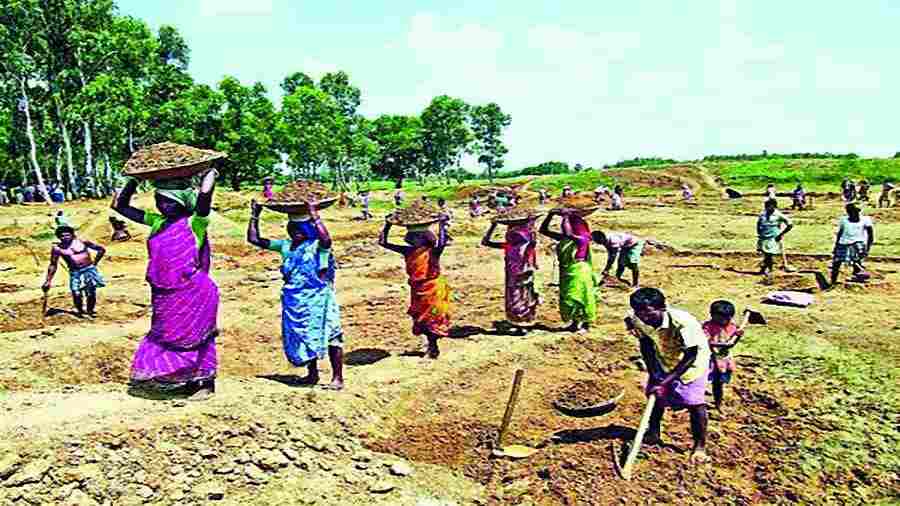The Centre’s decision to stop funds to Bengal under the Mahatma Gandhi National Rural Employment Guarantee Act will have denied job opportunities to 30 lakh rural families in the state this year, a study released on Monday by a research group suggests.
Another report, by a civil society organisation, has said the stoppage of rural job scheme funds to Bengal for the past one year — the last tranche of money came on December 26 last year — has led to widespread migration of rural labour.
The Centre has said funds will not be given until Bengal acts on the numerous instances of corruption in the scheme unearthed by a fact-finding team it had sent to the state last year.
Trinamul MPs have alleged discrimination, telling Parliament this month that Bengal had sent action-taken reports, but the Centre says the action has not been adequate.
No other state has ever been denied funds for such a long period under the scheme, which provides for up to 100 days of paid, unskilled work to every rural household in a year.
A study by private research group LibTech India, titled “Status of MGNREGA employment and wages in West Bengal”, has found that an average 49.25 lakh rural families had availed work under the scheme in each of the pre-Covid years of 2018-19 and 2019-20.
This yearly average rose to 77.81 lakh families in Covid-struck 2020-21 and 2021-22 but plummeted to 16.2 lakh families by December 18 this year, covering eight-and-ahalf months of the current financial year.
With little likelihood of a quick resolution of the funds standoff, and therefore of any fresh work under the scheme, the study has subtracted 16.2 lakh from the normal-year average of 49.25 lakh to suggest that 30 lakh families are likely to lose out this financial year.
The study has also calculated the average persondays a year under the scheme in Bengal between April 1 and December 18 every year from 2018-19 to 2022-23.
It has found the figure was 21.93 crore in each of the two pre-Covid years, 32.02 crore in each Covid year, and just 3.73 crore this financial year — a drop of 83 per cent from the pre-Covid figure.
“If we compare with pre-Covid years, now that the issue remains unresolved, nearly 3 million families could be denied work in Bengal in the 2022-23 fiscal,” said Parul Saboo, a researcher with LibTech India.
“Also, in terms of persondays, there is already a drop of about 85 per cent in the nine months of the current fiscal compared with the average persondays of work generated in the pre-Covid years for the same period.”
Participation in the scheme in Bengal has been among the highest in the country. Of the total expenditure on the MGNREGA, about 10 per cent is spent on Bengal — substantially higher than the state’s seven per cent share of the country’s population.
With the Centre stopping funds, those who worked in projects under the scheme in Bengal over the past one year are yet to receive their wages. The wage backlog in the state is Rs 2,744 crore.
“The stoppage of wages and work in the state amounts to a violation of the right to life of more than 3.4 crore registered workers across the state,” Saboo said.
The NREGA Sangharsh Morcha (NSM), an umbrella body of civil society groups, has released the report of an investigation on the impact of the stoppage of funds.
“In some villages, men and women in more than half of the households have migrated for work, even ones who didn’t migrate earlier. Most of the workers we spoke to in Nadia district stated that migration had increased because MGNREGA was not operational,” the report says.
Topojay Mukherjee, an NSM member, said people in Bengal had lost faith in the scheme.“Even if the Centre starts providing funds now, it will take a long time to revive the enthusiasm among the workers,” he said.










